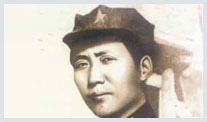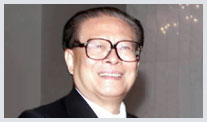|
Going their own way--China's younger generation 
|
| 2002-10-22 09:52:53 |
Compared to their predecessors, the first generation born after China's reform and opening up are more pragmatic, more open to the outside world and have a stronger sense of individuality.
 It's late autumn, but in Workers' Stadium in Beijing, it's sweltering like a summer night. The arrival of GLAY, Japan's "pop-idol" rock band, has driven tens of thousands of Chinese youngsters into frenzy, with a whirlwind of hi-tech stage lighting and deafening music.
It's late autumn, but in Workers' Stadium in Beijing, it's sweltering like a summer night. The arrival of GLAY, Japan's "pop-idol" rock band, has driven tens of thousands of Chinese youngsters into frenzy, with a whirlwind of hi-tech stage lighting and deafening music.
Among them is Chen Minghui. A sophomore at Beijing Foreign Studies University, she saved what she earned from her part-time job to buy a ticket.
Her workload is heavy, so she says a diversion like this is quite welcome. She keeps the bag bearing the image of the spiky-haired rock stars right beside her sketch of Jacky Chang, her favorite Hong Kong singer.
"I went to the live concert because I like to have new experiences and the excitement it offers me. I'm really impressed by the sort of visual effect it produced," said Chen Minghui.
Like many of her classmates, Chen has a fast-paced life. Apart from her studies, she's in charge of the public relations department of the student union. But in her spare time, she also frequents this coffee bar near the school, sipping cappuccino, chatting with her pals and thinking over some of the "big issues" that are to confront her, as she calls them finding a job in Beijing or pursuing further studies here, or perhaps even abroad. Life is unfolding before her and offering abundant opportunities.
Compared to the previous generations, this is one that is puzzled by perhaps too many choices, instead of too few.
 It might be dangerous to generalize any one generation, yet for those who spent their student years in earlier eras, time has definitely changed.
It might be dangerous to generalize any one generation, yet for those who spent their student years in earlier eras, time has definitely changed.
"At the time we had this saying of playing the role of a little screw and wherever we were put, we would stay there and play our role, that was an attitude cultivated in us," said Mei Renyi, professor who was a college student in the '50s.
"We were a generation of idealism and a generation brought up with a belief in collectivism. We all used to be one of the same kind. We believe we were to become the successors of the revolutionary cause," said Zhou Yan, professor who was a college student in the '70s.
Indeed the differences are great. Chen Minghui's generation has not been stirred by the ideological rigor or social turmoil that accompanied previous ones. Instead, they've had the privilege of enjoying a proliferation of media since childhood -- television, newspapers and the Internet. Today, most are veteran netizens, and the number of Internet friends on their "QQ" messenger service list can be as many as 100. And perhaps as a result of the increased exposure to various ideas, they have learned to champion individuality and appreciate differences and are proud of this very fact.
 "We are different from our parents. We have our own thoughts and make our own choices. We are proud of this sense of individuality," said Zheng Chengguo, student of Beijing Foreign Studies University.
"We are different from our parents. We have our own thoughts and make our own choices. We are proud of this sense of individuality," said Zheng Chengguo, student of Beijing Foreign Studies University.
Sometimes this confidence may blind them to their little weaknesses. Compared to the elder generations, they might lack a little devotion, idealism and retrospection. But then, each generation has its own preoccupations and concerns. This one will have to brave the challenges as they mature, too.
Youth culture is a topic of all times. If the generation of the '60s was one overcome by revolutionary idealism; that of the '70s and '80s a generation of "spiritual elite" what best describes the generation of the '90s and onwards? Here we seem to be at a loss. But let's not be baffled by one single term that caps all of them, for it is the word "diversity" that seems to find the best expression in this generation.
|
|










